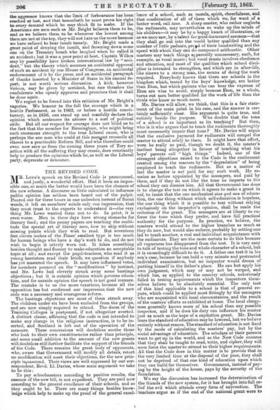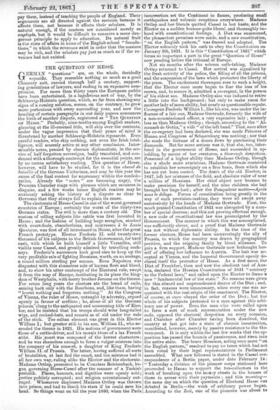THE REVISED CODE.
MR. Lowe's speech on the Revised Code is pronounced, and justly, a wonderful effort. Had it been an impos- sible one, so much the better would have been the chances of the new scheme. A discourse so little calculated to influence public opinion has seldom been heard out of the pulpit. Poured out for three hours in one unbroken torrent of fluent words, it left on members' minds only one impression, that they must trust to the experts to understand it—the very thing Mr. Lowe wanted them not to do. In print, it is even worse. Men in these days have strong stomachs for literary food; and the penny papers are teaching the multi- tude the special art of literary men, bow to skip without missing points which they wish to read. But seventeen feet eleven inches of the Times' smallest type is too much for human beings who have a day's work to do, and do not wish to begin it utterly worn out. It takes something besides thought and fluency to make education an acceptable topic at all ; and except the pupil-teachers, who read it as young barristers read their briefs, we question if anybody has yet mastered the speech. It may have influenced votes, for members pounced on the " modifications " by instinct, and Mr. Lowe bad cleverly struck away some hustings objections ; but it is outside opinion which governs educa- tion, and for outside opinion the speech is not good manure. The mistake is to us the more vexatious, because all the opposition has but confirmed our impression that the new code was a necessary and courageous reform.
The hustings objections are most of them struck away. The children under six have been excluded from the groups, and are now simply required to attend. The doom of the Training Colleges is postponed, if not altogether averted. A distinct clause, affirming that the code is not intended to make any change in the religious instruction, is to be in- serted, and Scotland is left out of the operation of the measure. These concessions will doubtless soothe those who look to their own constituencies rather than principle, and some small addition to the amount of the new grants will doubtless still further facilitate the support of the friends of the Code. There remains the great body of opponents, who, aware that Government will modify all details, retort no modification will meet their objections, for the new prin- ciple is„unedund. Their views are well expressed by our cor- respondent, Revd. Ll. Davies, whose main argument we take to be this : To pay schoolmasters according to positive results, the essence of the new bill, is not expedient. They are paid now according to the general excellence of their schools, and so they ought to be. There are many things besides know- ledge which help to make up the proof of the general excel- 1 ence of a school, such as morals, .spirit, cheerfulness, and that combination of all of them which we, for want of a better word, call tone. A sharp master, who rather neglects the rudiments, may nevertheless so wake up the minds of his children—it may be by a happy knack of illustration, or as we once saw, by a talent for good-humoured sarcasm—that they shall go out into the world better qualified than any number of little pedants, prcv.d of their handwriting and the speed with which they can do compound arithmetic. Other masters may teach things apparently unnecessary, such, for example, as vocal music ; but vocal music involves obedience and attention, and most of the qualities which school disci- pline is intended to strengthen, and which are in after-life, like sinews to a strong man, the means of doing the work required. Everybody knows that there are schools in the kingdom which, tested by the boys' knowledge, are better than Eton, but which parents who can bear the expense of Eton are wise to avoid, simply because Eton, as a whale, turns out men better qualified for the work of life than the rivals who know so much more.
Mr. Davies will allow, we think, that this is a fair state- ment of the main point in his case, and the answer is cer- tainly sufficiently clear. His argument is quite true, and entirely beside the purpose. Who doubts that the tone of a school is as important as its teaching? But then, who is it who argues that to teach the rudiments thoroughly must necessarily impair that tone? Mr. Davies will argue that the exclusive payment for rudiments will compel the master to attend solely to them. It might have that effect, were he really so paid, though we doubt it, the master's instinct being altogether in favour of teaching what his boys' parents call "high things." Indeed, one of the strongest objections raised to the Code is the excitement created among the masters by the "degradation" of being employed to teach the rudiments. But as a matter of fact the master is not paid for any such work. He re- mains as before appointed by the managers, and paid by them and if they do not like the tone he imparts to the schoc:1 they can dismiss him. All that Government has done is to change the test on which it agrees to make a grant in aid, to insist that the one mechanical sine gad non of educa- tion, the one thing without which self-education is hopeless, the one thing which it is possible to test without relying exclusively on the inspector's opinion, shall be made the criterion of the grant. The managers are at liberty to en- force the tone which they prefer, and have full practical authority for the purpose. In practice, we believe, the masters would attend to the higher branches as much as they do now, but would also enforce, probably by setting one lad to teach another, a real and individual acquaintance with the rudiments. They are the more certain to do this because all vagueness has disappeared from the test. It is very easy to talk of testing the tone and whole character of a school, but it is exceedingly difficult to do it. A father can test it in his son's case, because he' can hold a very minute and protracted individual examination, but no inspector would dream of putting himself in the father's place. He can but apply his own judgment, which may or may not be warped, and which has, as applied to the country schools, notoriously failed in testing acquirements which the inspectors them- selves believe to be absolutely essential. The only test of this kind applicable to a school is that of general re- pute, which could be applied most fittingly by the managers who are acquainted with local circumstances, and the result of the masters' efforts as exhibited at home. The local clergy- man generally knows more of his school than any possible inspector, and if he does his duty can influence his master just as much as the hope of a capitation grant. Mr. Davies fears the standard of education may be lowered, but we believe entirely without reason. The standard of education is not fixed by the mode of calculating the masters' pay, but by the social advantage of education. The scholars or their parents want to get up in the world, and as the New Code ensures that they shall be taught to read, write, and cipher, they will soon force the master to attend to their higher requirements. All that the Code does in this matter is to provide that in the very limited time at the disposal of the poor, they shall not be deprived of that one kind of education upon which they can build for themselves. Government, instead of pay- ing by the height of the house, pays by the security of the foundation.
We say the discussion has increased the determination of the friends of the new system, for it has brought into full re- lief the evil which attends every form of subvention. The teachers argue as if the end of the national grant were to pay them, instead of teaching the people of England. Their arguments are all directed against the revision because it affects them, not because it affects their scholars. It is natural enough, if the masters are considered merely as employes, but it would be difficult to conceive a more dan- gerous principle to apply to education. Its natural fruit is the state of affairs in some of the English school "founda- tions," in which the revenues exist in order that the masters may be rich, and the scholars pay just as much as if the re- venues had not existed.































 Previous page
Previous page